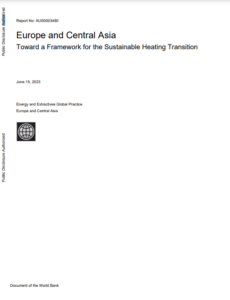Full Title: Europe and Central Asia Toward a Framework for the Sustainable Heating Transition
Author(s): The World Bank
Publisher(s): The World Bank
Publication Date: June 15, 2023
Full Text: Download Resource
Description (excerpt):
The heating sector in the World Bank’s Europe and Central Asia (ECA) Region is unsustainable. District heating (DH), where available, relies heavily on coal and natural gas, often provides substandard levels of service, and is typically unable to fully recover its costs. Households that do not have access to DH rely mostly on underpriced coal and unregulated firewood, burned in boilers or stoves that are almost always inefficient and polluting. On the demand-side, only a small fraction of the building stock has been renovated; as a result, buildings often consume 2-3 times more energy per square meter than those in Western Europe—despite the fact that most countries in ECA have a lower overall per capita energy use. This makes heating unaffordable for many of its citizens. There is thus an urgent need to transition to more sustainable heating.
For this report, “sustainable” heating solutions are those that are widely affordable, reliable, efficient, low-emission, and consistent with carbon neutrality by mid-century. This report reviews the status and trends of space heating in ECA; identifies common regional barriers to sustainable heating; assesses heating options (including costs and technical viability); and proposes a framework, with policies and programs, for planning the transition. The report is designed primarily for policy makers and practitioners in the region who work in the heating sector. Where possible, given the broad mix of countries, options are provided that accommodate a range of economic conditions, institutional capacities, dependency on fossil fuels, availability of local resources, and other factors. The report includes data and analysis for all 23 ECA countries, where available, to illustrate the diversity of contexts and pathways to sustainability. Addressing the considerable challenges in the transition to sustainable heating is an urgent imperative for policymakers to ensure heating services can be affordable, efficient, and clean. The decarbonization pathways in ECA countries to net zero by mid-century necessitate the transition to sustainable heating. Thus, many of the existing institutions, systems, fuels, and technologies will have to undergo a massive shift to achieve this goal, as will enabling policies, financing, business models and communications. Given the limited time remaining, the transition must be started this decade and at scale. This is also an emerging opportunity as notable progress has been made, and technologies and approaches are already being tried and tested and lessons learned.
